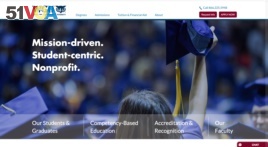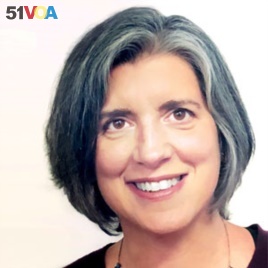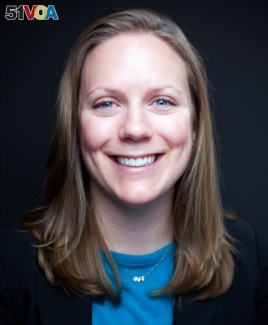02 March, 2019
Students hoping to visit the grounds of Western Governors University will not find them: WGU operates entirely over the internet.
But that is not its only difference from most other colleges and universities in the United States. It does not have classes or professors either -- at least not in the traditional sense.
WGU is a private, not-for-profit school that offers study programs leading to a bachelor's or master's degree. Its programs have been approved by educational accrediting agencies. They are accepted through a system known as competency-based education, or CBE.
Students in a CBE program, such as the one at Western Governors, choose a central field of study, just as they would at a traditional college or university. Yet instead of attending a series of classes led by professors or teaching assistants, the students direct themselves.
CBE programs require students to demonstrate their understanding of a given set of skills. Students must prove their mastery of skills that relate to their field of choice through self-study and use of their existing knowledge of the subject. The programs also require them to prove their mastery by taking exams on those skills. Once they have demonstrated all the skills their study program requires, the students earn their degree.

WGU is a private, not-for-profit school that offers study programs leading to a bachelor's or master's degree.
How Western Governors University came to be
Marni Baker Stein says the people who set up Western Governors University in 1997 knew there would be a growing need for different methods of higher education.
Stein is the chief academic officer at WGU. Stein told VOA that in recent years, more and more nontraditional students have been entering U.S. higher education. Many are people who decided to attend college later in life, instead of right after high school, as most Americans who go to college do. They also include men and women who may have attended college at one point, but left without earning a degree.
Most nontraditional students have full-time jobs, notes Stein. They see higher education as the best path towards getting better jobs and improving their positions in life. But they need to do so at a rate that works for them and their day-to-day activities.
In the United States, most traditional colleges and universities operate around set time periods. Classes usually start in the late summer and end in the spring of every year. These academic calendars are usually divided into two or three study terms, each lasting around 15 weeks.
Stein notes that in a CBE program, students can start any time they want. If students work hard, they can finish a class as soon as they successfully complete the final skills test, meaning they can earn their degree faster than in a traditional academic program.
Western Governors students might not sit in classrooms with professors for several hours a week. But Stein says each class has one or more teachers who communicate with students over the internet. These instructors guide the students through their self-study and offer help whenever they need it. There are also plenty of special materials to improve the self-learning experience. The materials can include videos, writing projects and computer software programs.
Stein adds that each WGU student has a university representative working with them throughout their entire program. This person follows their progress and makes sure they choose the right classes. And people responsible for the final exams provide complex and helpful criticism for students who fail.
"So our students aren't on a physical campus," Stein said. "But they are surrounded by this community of care that is able to personalize their interactions with them in very powerful ways."

Marni Baker Stein, chief academic officer at Western Governors University
Western Governors reports that it serves over 113,000 students, both in and outside the United States. And CBE programs are slowly growing in popularity around the country.
Kelle Parsons studies CBE programs for the American Institutes for Research, a non-profit group with offices in Washington, D.C. She argues that CBE programs are nothing new, and that U.S. educators have been experimenting with them since the 1970s. However, CBE has been getting more attention recently than it may ever have in the past, even if that popularity has not grown as much as some had expected over the last five years.
Last year, Parsons' organization asked officials at 501 U.S. colleges and universities about their opinions on CBE. The group released its findings last month. A total of 57 schools were shown to be operating some form of CBE program. About 85 percent of all the higher education officials said they were either currently designing a CBE program at their school or were considering doing so.
Why the growing popularity?
Parson's says growing interest in CBE comes from the increased debate over three major issues facing American higher education: access, cost and quality.
CBE programs have made use of many new technologies, she adds. This helps reduce barriers for nontraditional and other students by bringing higher education to them. And programs that permit students to work at their own speed may save students money by reducing the time it takes for them to earn a degree.
Also, Parson says many companies struggle in placing value on what a job candidate may have learned from a psychology or history study program, for example.
"Employers are not satisfied ... just know[ing] that someone has a degree," she said. "They want to know what skills they have."
CBE classes are based on mastering a skill, like how to solve a given security problem or write a project proposal, instead of a general area of knowledge. So a student's academic records show exactly what skills they offer to an employer rather than just a grade point average.

Kelle Parsons, senior researcher at the American Institutes for Research.
But some educators have concerns about the value of the education CBE programs offer. Johann Neem is a professor of U.S. history and higher education policy at Western Washington University in Bellingham, Washington.
Neem argues that the purpose of higher education is not simply to help students earn a degree. It should teach students how to think critically, understand the subjects they are studying more deeply and see how they are connected to other subjects. That way they can put the knowledge to better use.
"You don't need to just master a set of skills or a small body of knowledge," he said. "You need to explore, think ... get shaken, have a conversation ... struggle. And those things take time. They take relationships. They take actually being in an environment where those are the most valuable things."
The promises of easier access and lower cost will likely make CBE programs more desirable for students from poor families, says Neem. But as the quality of the education in these programs may be lesser, low-income students may not actually be any better off in the end. Instead of supporting CBE, he adds, policy makers and educators should look for ways to improve access and reduce costs for traditional higher education.
I'm Dorothy Gundy.
And I'm Pete Musto
Pete Musto reported this story for VOA Learning English. George Grow was the editor.
We want to hear from you. How popular are competency-based education programs in your country? Write to us in the Comments Section or on 51VOA.COM.
_____________________________________________________________
Words in This Story
bachelor's (degree) – n. a degree that is given to a student by a college or university usually after four years of study
master's degree – n. a degree that is given to a student by a college or university usually after one or two years of additional study following a bachelor's degree
accredit(ing) – v. to say that something is good enough to be given official approval
mastery – n. knowledge and skill that allows you to do, use, or understand something very well
academic – adj. of or relating to schools and education
campus – n. the area and buildings around a university, college or school
personalize – v. to change or design something for a particular person
interaction(s) – n. to talk or do things with other people
access – n. a way of being able to use or get something
grade point average (GPA) – n. a number that indicates a student's average grade